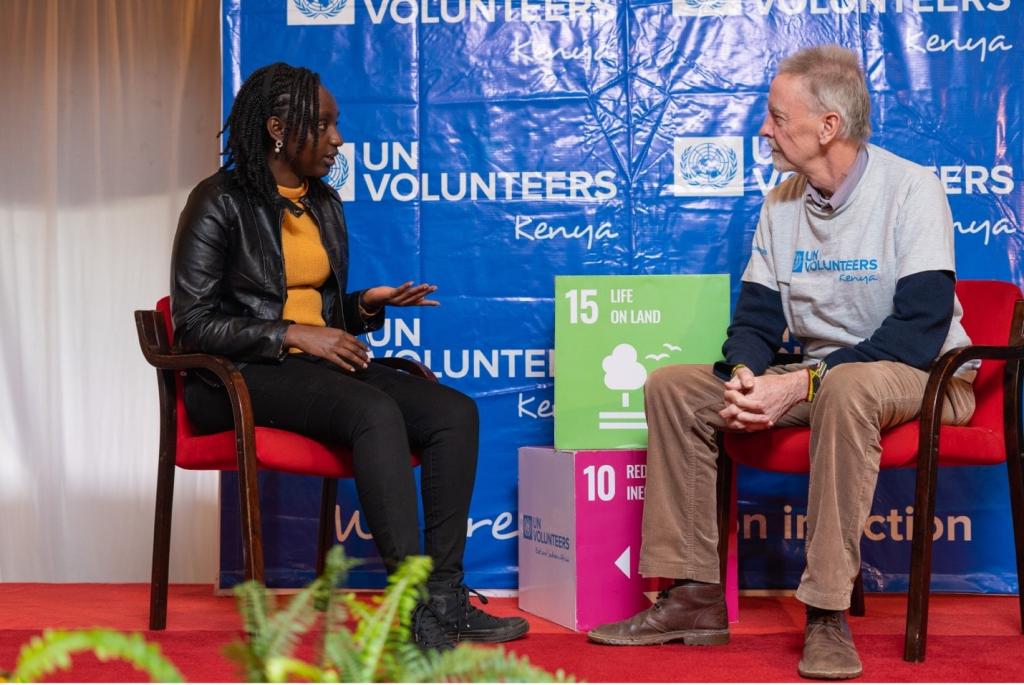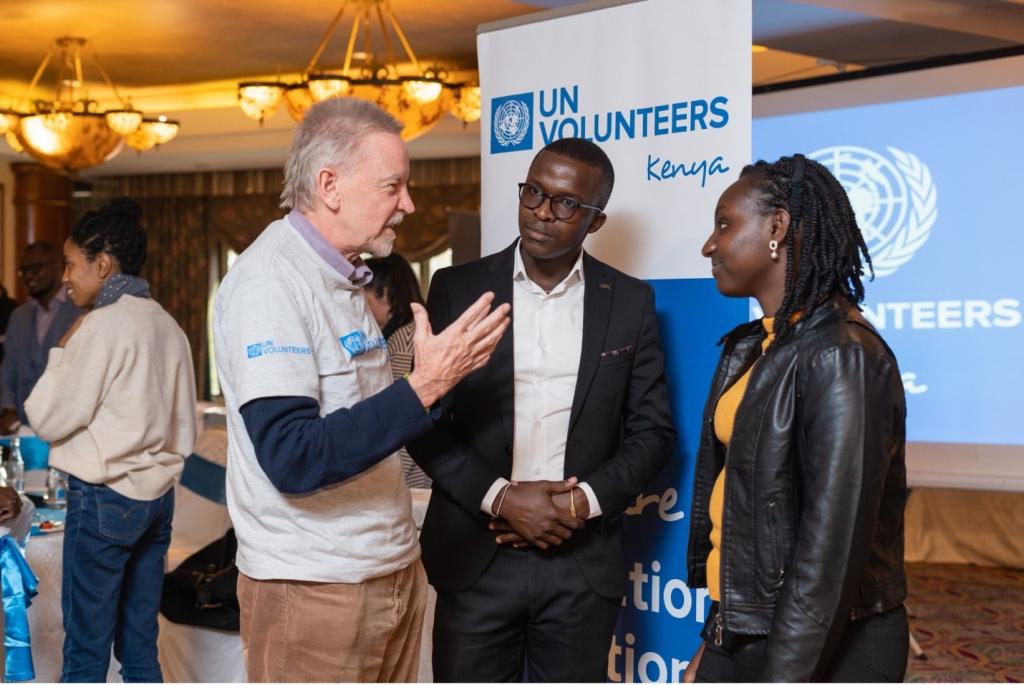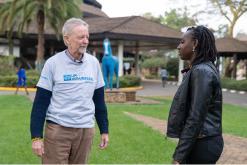A recent study, Intergenerational inequities in exposure to climate extremes, estimated that children born in 2020 will experience a two- to seven-fold increase in extreme climate events, particularly heat waves, compared with people born in 1960, under current climate policy pledges. This year’s International Youth Day on 12 August is highlighting the potential of Intergenerational Solidarity in advancing the Sustainable Development Goals in line with the Our Common Agenda report which, among others, calls on policymakers to listen to, and work with, youth.
To promote intergenerational solidarity, two UN Volunteers serving with the UN Environment Programme (UNEP) in Kenya met during a training session organized by the UNV Kenya Office. Charlie Bartlett from Britain, 68, serves with UNEP’s Ecosystems Division as a writer and copy editor, while Caroline Kamau from Kenya, 24, serves with UNEP’s Corporate Services Division, Enterprise Solutions Section, as a machine learning and information systems developer, mainly supporting the development of the Global partnership on Marine litter (GPML) Digital Platform.
They shared their thoughts, fears and perspectives on climate change and the future of humanity.
______________________________________
Caroline: This year’s theme for Youth Day is intergenerational solidarity. What comes to your mind when you hear that?
Charlie: That we are connected, and we have mutual responsibilities. We all live in one planet and face common challenges despite our age differences, and we can only solve them together. There’s also the question of fairness. Developed countries – and my generation in those countries – bear a heavy responsibility for the climate, biodiversity and pollution crises we currently face. We need to encourage younger generations to make their voices heard.
Caroline: What do you think has created the climate issues the world faces today?
Charlie: I think our generation had the wrong, materialistic way of measuring success and happiness, and we passed this to you. We exploited nature without nurturing it sufficiently and, unfortunately, your generation and your children will have to come up with innovative solutions to the many social, environmental and economic problems facing the world right now.
Caroline: That is sad.
Charlie: Unfortunately, it is the reality. But we cannot lose hope for tomorrow. Human beings are endlessly inventive and, when push comes to shove, I believe they will make the right changes to ensure the survival of the human race.

Caroline: What changes have you seen in the last 50 years?
Charlie: More prosperity in material terms and greater inequalities. I have also seen more extreme weather events, land degradation, sharply rising levels of air and water pollution, as well as biodiversity loss: one million species are at risk of extinction. An estimated 80 per cent of wastewater is untreated and we are pouring plastic and other pollutants into the ocean at unprecedented rates. We need to be much more aware of nature’s role in sustaining human life.
The positive news is that perceptions are changing, though slowly. In my early years, no one talked about climate change. There was a complete lack of awareness of the dangers of fossil fuels - we only saw the benefits. Today, climate change has been brought to the forefront of political discourse. --Charlie Bartlett
Caroline: Too many people are still going hungry. According to a recent report by the Food and Agriculture Organization of the United Nations, "as many as 828 million people" were affected by hunger globally in 2021. How do we ensure a just transition to a more equal world?
Charlie: We need to listen to what the scientists are telling us. We need to transform food systems to curb global warming, biodiversity loss and pollution. A good starting point is the UNEP website and also George Monbiot’s new book Regenesis.
Caroline: But I also think we can leverage the power of social media, right? Do you have a social media account?
Charlie: In fact, I do have social media accounts but don’t use them effectively enough. I agree that social media has huge potential to help create the changes we need to implement this decade to achieve the Sustainable Development Agenda: 90 per cent of information currently consumed by youth is through mobile apps. But we also need political pressure to force governments to act. Climate activists can make a difference. We are still way off course to achieving the Sustainable Development Goals.
Charlie: Let me also ask you some questions. As a younger person, are you optimistic or fearful about the future of humanity and the health of the Earth’s ecosystems?
Caroline: I am fearful and anxious of the future because our generation is much larger, estimated at about 8 billion people, in comparison to 5 billion people in your generation. This means that we have the potential to cause even much more damage than your generation if we do not step up and take the necessary action.
But more than the fear, I’m optimistic that as young people, we could take advantage of our numbers and make the difference in protecting and preserving our planet, by adopting more sustainable lifestyles, and making efforts to achieve a circular economy. --Caroline Kamau

Charlie: Do you feel that young people today are willing to take the climate actions that my generation didn’t take - such as using bicycles or public transport to get to work instead of cars, reducing meat consumption, or flying less to curb carbon emissions?
Caroline: I believe there are more young people today who are aware of the climate situation and are willing to be more intentional and thoughtful about their actions in comparison to your generation. What they lack are role models, mentors and guidance to inspire them. The majority of their role models are focused on material prosperity, making decisions without assessing the impact of their decisions on nature. They also lack supportive policy environments. For example, why would I take a bicycle to work if there is no conducive infrastructure? Individual action alone will not make the difference, what we really need is systemic change, which can only be achieved at a policy level. Policymakers need to be more intentional about climate action.
Charlie: Do you ever feel that politicians pay lip service to the views of young climate activists, but in practice fail to take their views into account? If so, what can be done about this?
Caroline: I think the key, as Greta Thunberg says, is to focus on the science and highlight the damage being done by companies and governments which, for instance, subsidize fossil fuels and broken food systems. Young people need to be focused, resilient, active and persuasive in promoting the latest scientific findings to governments. They also need to play their role in choosing leaders, or even becoming leaders who are ready to adopt policies that will protect our planet.
Caroline: From where you stand, what is your message to the young generation today? Do you really think we will ever achieve truly sustainable, equitable development?
Charlie: Margaret Mead once said: Never doubt that a small group of thoughtful, committed individuals can change the world. Every small action counts, and I think this is a critical message for every young person. You should never feel powerless. Get politically active and volunteer whenever you get a chance. Start with your local community As the UN Secretary-General said at the ECOSOC annual Youth Forum earlier this year: "Keep pushing, mobilizing, bringing your ideas to the table… we have no time to lose."
Caroline: Are there any low-hanging actions that young people can personally take immediately to turn things around?
Charlie: Yes. Living simply and sustainably is a good starting point.
Becoming more conscious consumers from the way we eat, travel, use energy and water, to the stuff we buy. Remember, every consumption is linked to the use of resources and labour somewhere in the world. We can all choose to vote with our wallets, for the future we want. Also, learn more and share your knowledge widely. Empower yourself with knowledge so that you can convince others. Be bold and collaborate with others. You can lead by example through your own sustainable actions. Let your voice be heard. --Charlie Bartlett

